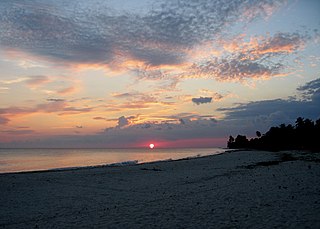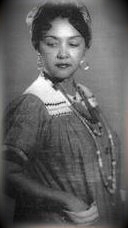
Leslie François Saint Roc Manigat was a Haitian politician who was elected as President of Haiti in a tightly controlled military held election in January 1988. He served as President for only a few months, from February 1988 to June 1988, before being ousted by the military in a coup d'état.
The Haiti national football team represents Haiti in international football. Haiti is administered by the Fédération Haïtienne de Football (FHF), the governing body for football in Haiti. They have been a member of FIFA since 1934, a member of CONCACAF since 1961 and a member of the Caribbean Football Union (CFU) since 1978. Haiti's home ground is Stade Sylvio Cator in Port-au-Prince and the team's manager is Gabriel Calderón Pellegrino.
Le Nouvelliste is the name of:
Le Nouvelliste is a Swiss French-language daily newspaper, published in Sion, Valais, by the publishing company Éditions Le Nouvelliste SA.

Oswald Durand was a Haitian poet and politician, said to be "to Haiti what Shakespeare is to England, and Dante to Italy." He was also a Haitian writer and poet of French and Creole expression, considered as the national poet of Haiti. Besides he was also judged as a Romantic poet and the most prolific one in the nineteen centuries. These 20th-century successors such as René Depestre, and Jacques Roumain congratulated Oswald Durand for his authentic expressions and honored him as a forerunner of Haitian indigenism. He was born in the northern part of Haiti, in the city of Saint-Louis du Nord. In 1842, both his parents died in the earthquake that devastated the city of Cape Haitian. Oswald Durand, and his sister, were welcomed in their maternal grandmother who raised them. He spent most of his childhood outside the city where he was born. Because of political instabilities in Haiti, he was forced to leave school and to educate himself without having recourse to a teacher.

In the administrative divisions of Haiti, the department is the first of four levels of government. Haiti is divided administratively into ten departments, which are further subdivided into 42 arrondissements, 145 communes, and 571 communal sections.

Port-Salut is a coastal commune in the Sud department of Haiti.

Pierre-Richard Bruny is a Haitian former professional footballer who played as a defender for Don Bosco FC and Joe Public.
As in many developing countries, radio reaches the widest audience in Haiti. Estimates vary, but more than 300 radio stations are believed to broadcast throughout the country. Talk show programs serve as one of the few ways in which ordinary Haitians can speak out about politics and the government. A law passed in 1997 declares the airwaves to be the property of the government, but at least 133 unlicensed radio stations operate freely. In addition, there are 50 community-based stations throughout the country.
Gerald Oriol Jr., commonly known as Ti Gerald, is internationally renowned for his work in the field of disability rights and has made significant contributions advancing the disability agenda in Haiti where he is the country’s twice-appointed Secretary of State for the Integration of Persons with Disabilities. He first served under President Michel Martelly from October 2011 to April 2016, and then again, under President Jovenel Moise from April 2017 to March 2020.

The Supreme Court of Haiti is the highest court in the Haitian legal system. The Supreme Court building is located in Port-au-Prince.
Frantz Duval is a Haitian journalist. Duval is the editor-in-chief of the newspaper Le Nouvelliste, both the largest print media in Haiti and sole daily newspaper; the director of the magazine Ticket Magazine and the radio station Magik 9.
Lucienne Heurtelou was a Haitian diplomat, women's rights advocate, and author. She was the First Lady of Haiti from 1946 to 1950 as the wife of Haitian President Dumarsais Estimé.

Gary Victor is a Haitian writer, playwright, and scriptwriter for television and radio. His radio sketches and the uncompromising tone of his television series on the manners of the Haitian bourgeoisie provoked controversy and discussion. He also served as the General Secretary of the Senate of Haiti from 1996 to 2000.
Rara tech is an electronic music subgenre that fuses the Afro-Haitian genre rara with house music. Haitian-style electronic dance music (EDM) in Haiti is often referred to as "HEDM". The origins of the genre and term was pioneered by Haitian artist, music producer, and DJ, Gardy Girault.

Lina Mathon-Blanchet was a Haitian pianist, music teacher and composer. First director of the Conservatoire National, she was interested in Haiti's folkloric traditions and was one of the first performers to include Vodou-influenced theatrical performances on the public stage in the country. Founding several folkloric troupes, she led her artists on tours throughout the United States and was noted as a teacher and mentor to many prominent Haitian performers. Trained in classical music traditions she collected traditional songs documenting the lyrics, melodies, and rhythms found as traditional themes in Haitian music. She is widely recognized as one of the most influential figures in the development of music in Haiti in the twentieth-century.

Little is known about the early history of Haitian license plates. Keith Marvin thought that the earliest plates were from the early 1930s, but older plates have since been found and at least one plate from 1923 exists. Early plates were marked with Rd'H,, HA., RH, or Haïti at various times. The Haitian coat of arms appeared on the plates from 1998 to 2002, the country flag was shown on the 2002 - 2005 plates, and since 2006 the background has shown a map of the country. With the last update on the design, the slogan La perle des Antilles was added at the bottom of the plate in white colour.

Jean-Michel Lapin is a Haitian politician who served as acting Prime Minister of Haiti from 2019 to 2020.

Ariel Henry is a Haitian neurosurgeon and politician who has served as the acting president of Haiti and the acting prime minister of Haiti since 20 July 2021, after the assassination of president Jovenel Moïse. He is also serving as the acting Minister of Interior and Territorial Communities. He became involved in a controversy due to his refusal to cooperate with the authorities over his links with Joseph-Félix Badio, one of the suspects accused of orchestrating the assassination of Jovenel Moïse on 7 July 2021. Officers who investigated the case suspected Henry was involved with planning the assassination.












